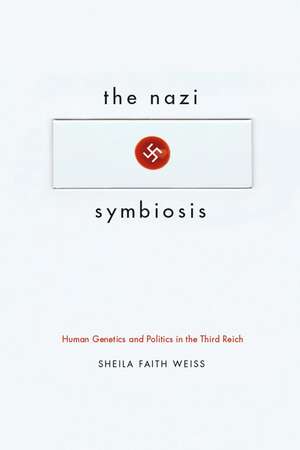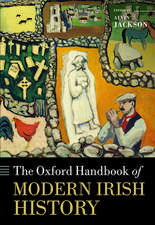The Nazi Symbiosis: Human Genetics and Politics in the Third Reich
Autor Sheila Faith Weissen Limba Engleză Paperback – 6 iun 2013
The Faustian bargain—in which an individual or group collaborates with an evil entity in order to obtain knowledge, power, or material gain—is perhaps best exemplified by the alliance between world-renowned human geneticists and the Nazi state. Under the swastika, German scientists descended into the moral abyss, perpetrating heinous medical crimes at Auschwitz and at euthanasia hospitals. But why did biomedical researchers accept such a bargain?
The Nazi Symbiosis offers a nuanced account of the myriad ways human heredity and Nazi politics reinforced each other before and during the Third Reich. Exploring the ethical and professional consequences for the scientists involved as well as the political ramifications for Nazi racial policies, Sheila Faith Weiss places genetics and eugenics in their larger international context. In questioning whether the motives that propelled German geneticists were different from the compromises that researchers from other countries and eras have faced, Weiss extends her argument into our modern moment, as we confront the promises and perils of genomic medicine today.
The Nazi Symbiosis offers a nuanced account of the myriad ways human heredity and Nazi politics reinforced each other before and during the Third Reich. Exploring the ethical and professional consequences for the scientists involved as well as the political ramifications for Nazi racial policies, Sheila Faith Weiss places genetics and eugenics in their larger international context. In questioning whether the motives that propelled German geneticists were different from the compromises that researchers from other countries and eras have faced, Weiss extends her argument into our modern moment, as we confront the promises and perils of genomic medicine today.
Preț: 295.33 lei
Nou
Puncte Express: 443
Preț estimativ în valută:
56.51€ • 61.63$ • 47.65£
56.51€ • 61.63$ • 47.65£
Carte tipărită la comandă
Livrare economică 24 aprilie-08 mai
Preluare comenzi: 021 569.72.76
Specificații
ISBN-13: 9780226055718
ISBN-10: 022605571X
Pagini: 392
Ilustrații: 37 halftones
Dimensiuni: 152 x 229 x 25 mm
Greutate: 0.53 kg
Editura: University of Chicago Press
Colecția University of Chicago Press
ISBN-10: 022605571X
Pagini: 392
Ilustrații: 37 halftones
Dimensiuni: 152 x 229 x 25 mm
Greutate: 0.53 kg
Editura: University of Chicago Press
Colecția University of Chicago Press
Notă biografică
Sheila Faith Weiss is professor of history at Clarkson University and author of Race Hygiene and National Efficiency: The Eugenics of Wilhelm Schallmayer.
Cuprins
Introduction: An Old Legend and a New Legacy
Chapter One: Human Heredity and Eugenics Make Their International Debut
Chapter Two: The Devil’s Directors at Dahlem
Chapter Three: The Munich Pact
Chapter Four: The Politics of Professional Talk
Chapter Five: Politicized Pedagogy
Chapter Six: The International Human Genetics Community Faces Nazi Germany
Conclusion: The Road Not Taken Elsewhere: Was There Something Unique about Human Heredity during the Third Reich?
Acknowledgments
Archival Sources
Notes
Index
Chapter One: Human Heredity and Eugenics Make Their International Debut
Chapter Two: The Devil’s Directors at Dahlem
Chapter Three: The Munich Pact
Chapter Four: The Politics of Professional Talk
Chapter Five: Politicized Pedagogy
Chapter Six: The International Human Genetics Community Faces Nazi Germany
Conclusion: The Road Not Taken Elsewhere: Was There Something Unique about Human Heredity during the Third Reich?
Acknowledgments
Archival Sources
Notes
Index
Recenzii
“Weiss cleverly intertwines the development of genetics in Germany with the rise of the Nazis. . . . Highly recommended.”
“Sheila Weiss modestly writes that she wants to provide a synthetic account of human genetics in this period that will be accessible to undergraduates as well as interested scholars beyond specialists’ circles. In fact she has done more than that, adding to basic knowledge of the topic and establishing the broader relevance of this case for a more general understanding of politics and science. . . . [T]his is a fine overview of human genetics in Nazi Germany that should circulate widely.”
“[A] detailed account of genetics research and its ethical ramifications under the Third Reich.”
“This well-written study helps elucidate the relationship between science and politics in the Third Reich and has enough details to satisfy scholars. At the same time, it provides an insightful narrative that a lay audience will find accessible and that will serve as a useful learning aid for students.”
“[T]his book will appeal to graduate students and professional historians who study Nazi Germany or the history of science.”
“Informative and compelling, The Nazi Symbiosis combines insightful analysis with the most up-to-date research on biomedicine in the Third Reich. Sheila Faith Weiss lays bare the notorious ‘Faustian bargain’ existing between German human geneticists and National Socialist officials in the construction of the deadly Nazi biocratic state. We now have the long-awaited comprehensive overview of one of the darkest chapters in the history of science.”
“More than sixty years after the liberation of Auschwitz, we finally have an accessible, compelling, and nuanced analysis of the special relationship between the Nazi state and the German human genetics community. As Sheila Faith Weiss persuasively argues in this stunning series of case studies of the production of genetic knowledge and eugenic policy and the dissemination of such knowledge to both the international community and to college preparatory students in Nazi Germany, both Nazi officials and German medical scientists stood to gain from what she identifies as the ‘Faustian bargain.’ As the reference to Faust suggests, the devil is in the details. Weiss uses never-before-analyzed student ‘exit examinations’ to explicate eugenics and eugenic knowledge even before the Nazi rise to power. In so doing, she offers a convincing explanation for the powerful and tragic symbiosis of genetic science and the State during National Socialism.”
“Sheila Faith Weiss shows how German geneticists enhanced their careers through research agendas that both advanced and benefited from the Nazi state’s criminal aims. A frightening study of the politics of genetic science under Hitler.”











